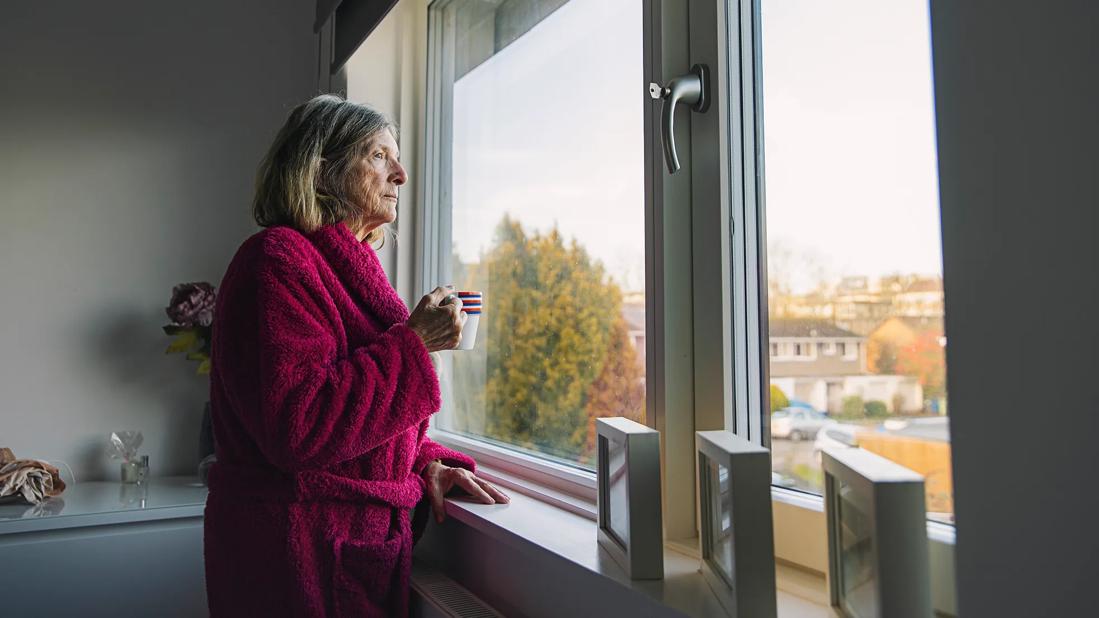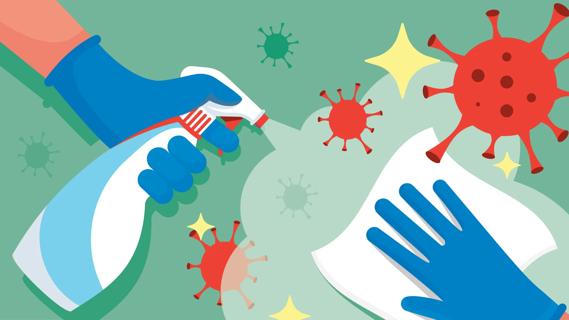Most people can return to work and regular life when they’re symptom-free for 24 hours

In the years since the emergence of COVID-19 as a global pandemic, much has changed.
Advertisement
Cleveland Clinic is a non-profit academic medical center. Advertising on our site helps support our mission. We do not endorse non-Cleveland Clinic products or services. Policy
And the guidelines about how to protect yourself from a COVID-19 infection and what to do if you catch the virus have undergone drastic shifts.
We know more about the COVID-19 virus now. And thanks to vaccines, more people have developed some level of protection from a debilitating COVID-19 infection.
With that in mind, what are COVID-19 guidelines we should be following these days? How many vaccines do you need? And how long before you can be around people if you test positive for COVID-19?
We talked with infectious disease physician Steven Gordon, MD, about the latest COVID-19 protocol.
COVID-19 may not be making the headlines it once did. But that doesn’t mean we’re “safe” from it.
COVID-19 infection can still cause severe, even life-threatening illness. That’s particularly true for people who are living with a compromised immune system and other conditions that can put them at higher risk.
COVID-19 is still a part of our respiratory illness mix. Right there with things like RSV and the flu.
But the U.S. Centers for Disease Control and Prevention (CDC) states that more than 98% of the United States population has some degree of immunity from COVID-19. That’s because of prior infection, vaccination or both.
Advertisement
And the latest COVID-19 guidelines from the CDC reflect that.
“We’re not seeing the cases and the morbidity rates from COVID-19 that we did in the past, and so the recommendations for people with COVID-19 today are similar to what we recommend for other respiratory viruses,” Dr. Gordon shares. “Any of these viruses can be dangerous to people and can spread easily. It’s important to respect that reality.”
These days, the CDC doesn’t have specific COVID-19 quarantine guidelines or recommendations of how long to isolate if you have COVID-19. But it does suggest a variety of ways to protect yourself from COVID-19 infection and guidance for what to do if you do become ill.
Note that there are exceptions to these general recommendations that take into account your particular risk factors and the risk you pose in spreading illness to others. More on that in a bit.
For most people with an average risk of developing complications from COVID-19, the CDC recommends following the same steps whether you’re ill with the flu, RSV, COVID-19 or other respiratory illnesses.
For people who don’t work in healthcare or have a health condition that comes with additional risk, the guidelines recommend the following:
Stay home and avoid contact with others until you are symptom-free for at least 24 hours without taking fever-reducing medications. Continue to take precautions, like wearing a mask and limiting unnecessary contact with others, for five days.
“The latest recommendations are the same for any respiratory illness,” Dr. Gordon notes. “Streamlining the guidance makes it easy for people to do the right thing when they’re ill. And it means that we can keep people from spreading the virus when they’re most contagious.”
Having the same recommendation for what to do when you get sick with any respiratory illness also means that you can follow proper protocol even if you don’t know for sure which virus got ahold of you.
“Not everyone is testing for COVID-19 and other respiratory illnesses regularly. And unless you require treatment, you don’t necessarily need to,” Dr. Gordon states. “We think of it in terms of ‘test to treat.’ As in, if you’re ill and need medication, it's important to be tested to make sure you get the treatment you need.”
Of course, if you choose to test at home for COVID-19, it’s an option. When you’re running a fever or fighting a nasty cough, it can be reassuring to know what’s causing it. And it can help to reinforce the precautions you should take to limit your interactions with other people.
Advertisement
Vaccination is your best line of defense against COVID-19. And while it may not provide complete protection from illness, the COVID-19 vaccine can help keep you out of the hospital.
“COVID-19 vaccination turns a bear into a cub,” Dr. Gordon illustrates. “You may still become infected with COVID-19 after vaccination. But the chance that you’ll develop severe complications from COVID-19 is much lower if you’ve been properly vaccinated.”
The CDC’s guidelines for COVID-19 vaccinations cover several scenarios. That’s because some people will benefit more from additional doses than others.
In general, adults and children 5 years and older with healthy immune systems are considered fully vaccinated if they receive a 2023–2024 formula COVID-19 vaccine. That is a one-dose vaccination for some brands (including Moderna or Pfizer-BioNTech vaccine). There is also a two-series 2023–2024 formula COVID-19 vaccination by Novavax. People getting that vaccine should receive two doses between three and eight weeks apart.
Those recommendations are the same whether you’ve been previously vaccinated against COVID-19 or not.
Kids ages 6 months to 4 years old need multiple doses to be up to date, and at least one of these doses should be the 2023–2024 formula COVID-19 vaccine. See the full vaccination schedule recommendation for kids here.
Advertisement
If you’re living with a compromised immune system, are over the age of 65 or are otherwise at a higher risk for more serious COVID-19 infection, your provider may recommend additional vaccinations — or annual vaccinations — to keep you safe from severe disease.
Some cases of COVID-19 require treatment. Other times, some home remedies can get you through.
Antiviral medications like Paxlovid™ andLagevrio™ are the standard first-line antiviral medications for people with COVID-19 infection whose symptoms don’t clear up on their own. They may also be recommended for some people who are at greater risk for developing serious symptoms.
Again, COVID-19 (and other respiratory illnesses) can be more dangerous for some people than for others. And so the CDC has separate guidelines and recommendations to help ensure the safety of people at high risk for complications from COVID-19.
Let’s take a look at some additional guidelines to consider for select populations.
The CDC guidelines have some specific recommendations regarding COVID-19 for people who work in a healthcare setting. That is, people who have direct contact with patients.
For example, the guidelines state that if after testing positive for COVID-19 and showing symptoms, healthcare workers can return to work when they meet all three of these criteria:
Advertisement
As we age, our immune systems tend to not work as well as they used to. That’s why older adults may benefit from additional strategies to lower their risk for severe cases of COVID-19.
The CDC recommendations for older adults include the following:
If you have a weakened immune system (immunocompromise), you can be at greater risk for severe illness from COVID-19, including an increased risk for hospitalization and life-threatening complications.
If you have a weakened immune system, talk with your healthcare provider about:
Pregnancy can weaken your immune system. So, the CDC guidelines urge people who are pregnant to be up-to-date with COVID-19 vaccinations.
Vaccination may also help pass along some degree of COVID-19 immunity to the developing fetus. That can be beneficial for when baby arrives because infants can’t be vaccinated themselves until the age of 6 months.
If there’s one thing we learned throughout the COVID-19 pandemic, it’s that viral illness protocols can change. Quickly.
Today’s CDC guidelines reflect our current reality. But new information becomes available all the time. Viruses mutate. They adapt to survive.
And so, the guidance must adapt as well. The CDC will continue to monitor the transmission of COVID-19 and other respiratory illnesses and update the guidelines as needed.
Until then, stay home until you’re symptom-free for 24 hours. Wash your hands. And talk with your healthcare provider to ensure you’re up to date with vaccinations.
Learn more about our editorial process.
Advertisement

This vital nutrient supports your health, but its role in COVID-19 prevention and treatment isn’t proven

Studies have shown promising results, but additional research is needed

Infection and inflammation can cause you to lose your voice and have other voice changes until you’re fully healed

A COVID-19 infection can bring on depression or anxiety months after physical symptoms go away

Just like the flu, COVID-19 continues to evolve every year with new and smarter variants

The latest omicron subvariants carry specific mutations that may allow the SARS-CoV-2 virus to be better at evading immune protection

You can work out with mild COVID-19, but not in a gym, and listen to your body and don’t overdo it

Lysol Disinfecting Wipes are just one of more than 500 products approved by the EPA for protection against the SARS-CoV-2 virus that causes COVID-19

If you’re feeling short of breath, sleep can be tough — propping yourself up or sleeping on your side may help

If you fear the unknown or find yourself needing reassurance often, you may identify with this attachment style

If you’re looking to boost your gut health, it’s better to get fiber from whole foods